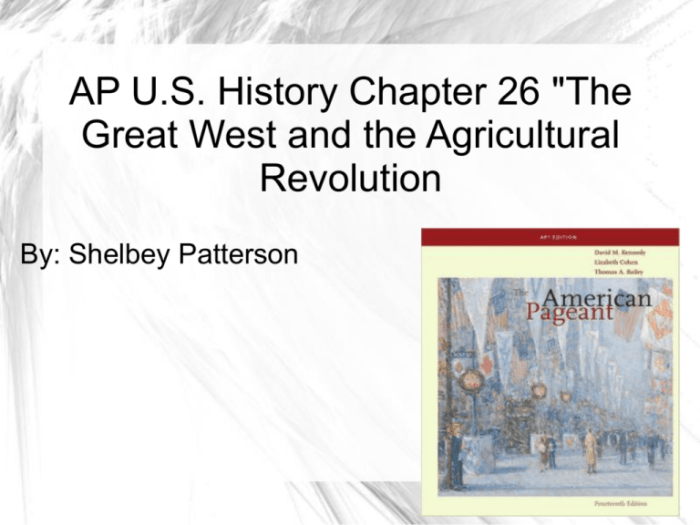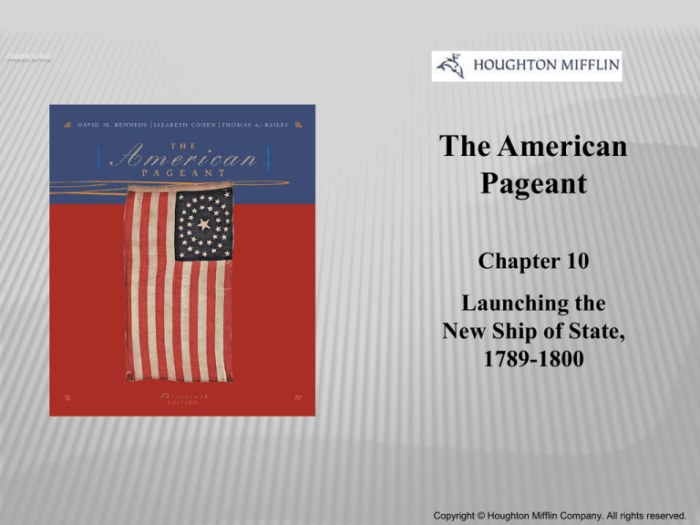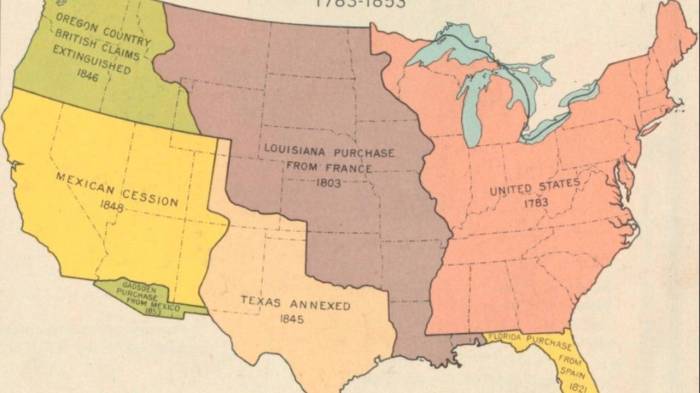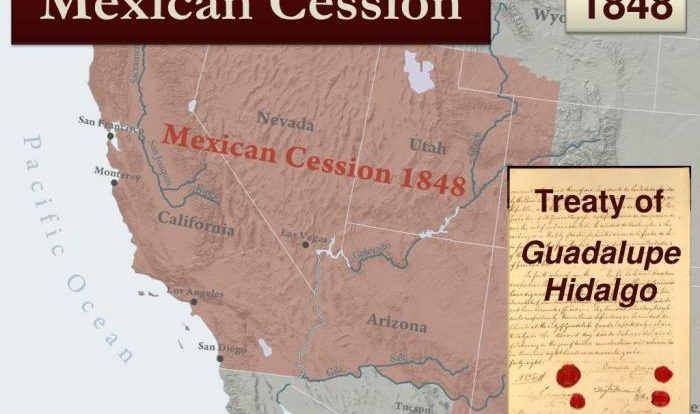American Pageant Chapter 26 notes offer a comprehensive overview of the United States’ expansionist policies during the late 19th and early 20th centuries. This chapter delves into the causes, key events, and consequences of American imperialism, providing a critical understanding of its impact on both the United States and the world.
The chapter begins by examining the factors that contributed to the rise of American imperialism, including economic expansion, Manifest Destiny, and the Spanish-American War. It then provides a detailed account of the Spanish-American War, discussing its causes, major battles, and the profound impact it had on the United States’ foreign policy.
The American Pageant: Chapter 26 Overview
Chapter 26 of The American Pageant explores the rise and decline of American imperialism during the late 19th and early 20th centuries. It examines the factors that led to the United States’ expansionist policies, the major events and figures involved, and the consequences of imperialism for both the United States and the territories it acquired.
The Rise of American Imperialism
In the late 19th century, the United States emerged as a major world power. Economic expansion, Manifest Destiny, and the Spanish-American War were key factors in the rise of American imperialism.
Economic Expansion
- The United States experienced rapid industrialization and economic growth, leading to a need for new markets and resources.
- Imperialism provided access to raw materials, cheap labor, and new markets for American goods.
Manifest Destiny
- The belief that the United States had a divine right to expand westward across the North American continent.
- Imperialism extended this belief beyond the continental United States, justifying the acquisition of overseas territories.
The Spanish-American War
- A conflict between the United States and Spain over Cuba and Puerto Rico.
- The war resulted in a decisive American victory and the acquisition of several overseas territories.
The Spanish-American War

The Spanish-American War was a short but decisive conflict that began in 1898. The war was fought over Cuba and Puerto Rico, which were both Spanish colonies.
Causes of the War
- Spanish suppression of Cuban independence movements
- American economic interests in Cuba
- Public outrage over the sinking of the USS Maine in Havana harbor
Major Battles
- Battle of Manila Bay (May 1, 1898)
- Battle of San Juan Hill (July 1, 1898)
- Battle of Santiago de Cuba (July 3, 1898)
Consequences of the War
- American victory and the acquisition of Puerto Rico, Guam, and the Philippines
- Emergence of the United States as a world power
- Increased debate over American imperialism
The Acquisition of Overseas Territories
As a result of the Spanish-American War and other factors, the United States acquired a number of overseas territories in the late 19th and early 20th centuries.
Acquired Territories
- Puerto Rico
- Guam
- Philippines
- Hawaii
- Alaska
Reasons for Acquisition
- Economic expansion
- Strategic military locations
- Manifest Destiny
Impact on the United States
- Increased global influence and power
- Economic benefits from new markets and resources
- Debate over the morality and consequences of imperialism
The Debate over Imperialism

The acquisition of overseas territories sparked a heated debate in the United States over the morality and consequences of imperialism.
Arguments For Imperialism
- Economic benefits
- Strategic military advantages
- Civilizing mission: spreading American values and institutions
Arguments Against Imperialism
- Violation of American principles of liberty and self-government
- Economic exploitation of foreign peoples
- Increased risk of war and conflict
Key Individuals and Groups, American pageant chapter 26 notes
- William McKinley (President who supported imperialism)
- Theodore Roosevelt (President who expanded American imperialism)
- Anti-Imperialist League (Group that opposed imperialism)
The Progressive Era and Imperialism: American Pageant Chapter 26 Notes
The Progressive Era was a period of social and political reform in the United States from the late 19th century to the early 20th century.
Progressive Ideals and Imperialism
Progressive ideals of social justice, economic equality, and democracy were often at odds with the realities of imperialism.
Debate within the Progressive Movement
- Some Progressives supported imperialism as a means of spreading American values.
- Others opposed imperialism as a violation of progressive principles.
The End of American Imperialism

American imperialism declined in the early 20th century due to a number of factors.
World War I
- The war shifted American focus from overseas expansion to domestic issues.
- The war weakened European powers, reducing their ability to maintain colonies.
Rise of Nationalism
- Nationalist movements in foreign territories challenged American control.
- The United States began to withdraw from its overseas possessions.
Question & Answer Hub
What were the main causes of American imperialism?
The main causes of American imperialism included economic expansion, Manifest Destiny, and the Spanish-American War.
What was the significance of the Spanish-American War?
The Spanish-American War marked a turning point in American foreign policy, leading to the acquisition of overseas territories and the emergence of the United States as a global power.
How did the Progressive Era influence American imperialism?
The Progressive Era saw the rise of progressive ideals that both supported and challenged American imperialism, leading to debates over the role of the United States in world affairs.

